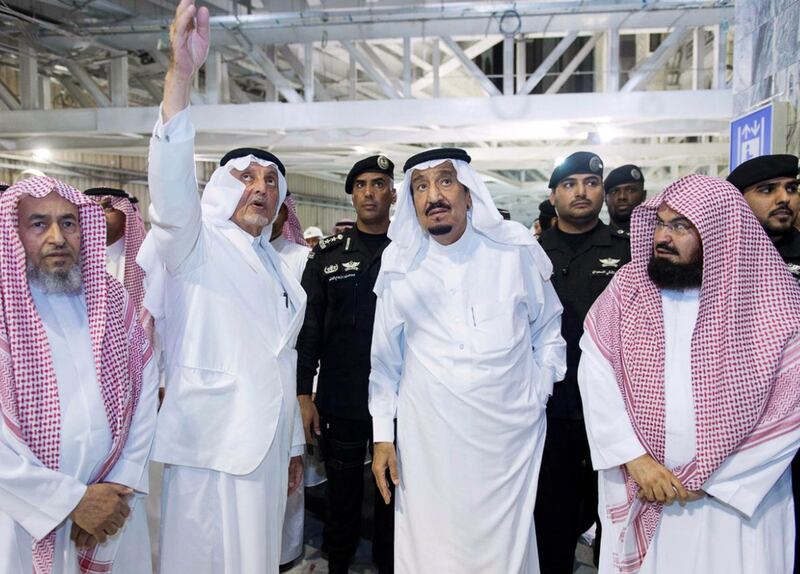Mecca // Saudi Arabia’s King Salman has vowed to find out what caused a crane collapse that killed 107 people at Mecca’s Grand Mosque ahead of the annual Haj pilgrimage.
The Haj, which last year drew about two million worshippers, will take place despite Friday’s tragedy, Saudi authorities said as crowds returned to pray a day after the incident.
Hundreds of thousands of pilgrims had already arrived in Mecca when the massive red and white crane toppled over during a Friday thunderstorm.
“We will investigate all the reasons and afterwards declare the results to the citizens,” King Salman said on Saturday after visiting the site, one of Islam’s holiest.
Parts of the Grand Mosque remained sealed off on Saturday around the wreckage of the crane, which also injured around 200 people when it crashed into a courtyard.
But there was little mourning among pilgrims, who snapped pictures of the collapsed metal and continued with their prayers and rituals.
“I wish I had died in the accident, as it happened at a holy hour and in a holy place,” Egyptian pilgrim Mohammed Ibrahim said.
Om Salma, a Moroccan pilgrim, said “our phones have not stopped ringing since yesterday with relatives calling to check on us”.
Another visitor caught up in the tragedy, Ahmed from Egypt, said he and those around him were “very scared, hysterical even”.
Indonesians and Indians were among those killed when the crane collapsed. The injured included Malaysians, Egyptians, Iranians, Turks, Afghans and Pakistanis.
King Salman expressed his condolences to the families of the dead, and visited the injured at a local hospital, the official Saudi Press Agency said.
A Saudi official said the Haj, expected to start on September 21, would go ahead despite the tragedy.
The contractor, engaged in a major expansion of the mosque, has been directed to ensure the safety of all other cranes at the site, SPA reported.
The cranes soar skywards over the sprawling expansion taking place beneath the Mecca Royal Clock Tower, the world’s third tallest building.
For years, work has been under way on a 400,000-square-metre enlargement of the Grand Mosque to allow it to accommodate up to 2.2 million people at once.
Pictures of the incident on Twitter showed bloodied bodies strewn across the courtyard, where part of the crane had landed atop an ornate, arched and colonnaded section of the complex.
An engineer for the Saudi Binladin Group, the developer, said the crane had been installed in “an extremely professional way” and that there had been no technical problem.
“It was an act of God,” he said.
Saudi Binladin Group belongs to the family of the late Al Qaeda leader Osama bin Laden.
Condolences came in from around the world, including from Arab leaders, as well as from Britain, Canada, India and Nigeria.
It was not the first tragedy to strike Mecca pilgrims, although the Haj has been practically incident-free in recent years.
In 2006, several hundred people died in a stampede during the Stoning of the Devil ritual in nearby Mina, following a similar incident two years earlier.
* Agence France-Presse





